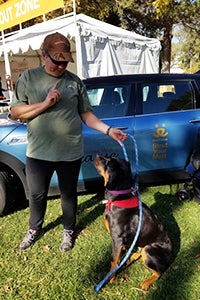Therapy dog gives veteran the courage to heal

Being part of the Best Friends No More Homeless Pets Network gives animal welfare groups all across the country the tools they need to save more lives, and the chance to work together to Save Them All.
Best Friends has network partners in every single state, and all of them are saving lives daily. We never get tired of hearing their stories, and that’s why we want to share them with you, too. So today, on Veterans Day, we're proud to present one from Canines With a Cause Foundation, based in Park City, Utah.
On good days, Trish, a retired senior master sergeant who spent 25 years in the United States Air Force, can leave her home feeling confident and secure in the world around her. On bad days, memories of her time serving in combat zones come flooding back, making it difficult for her to get out of bed.
That’s where her dog, Millie, comes in. Millie is barely a year old, but already she can sense when Trish is wrestling with the symptoms of post-traumatic stress disorder (PTSD), which combat soldiers often experience after witnessing the realities of war. When Millie’s instincts tell her that Trish is anxious or that a debilitating depression is about to set in, Millie goes to work using what she’s learned in training as a therapy dog to help Trish feel better.
“Millie makes me feel like myself again,” says Trish, who served five tours of duty in combat zones.
The healing power of dogs
 As participants in Canines With a Cause’s program, Millie and Trish get training together. Millie learns the best ways to help Trish navigate her PTSD, and Trish, in turn, learns how to communicate her needs to Millie.
As participants in Canines With a Cause’s program, Millie and Trish get training together. Millie learns the best ways to help Trish navigate her PTSD, and Trish, in turn, learns how to communicate her needs to Millie.
When soldiers return home, many — including Trish — may feel on edge, feeling like they need to watch their backs in case an enemy attacks. Therapy dogs such as Millie help their partners relax, so they can do the things others may take for granted — like falling asleep without having to leave the lights on.
Millie is also helping Trish get her self-esteem back. When Trish was deployed, she remembers being told by men with whom she served that she didn’t measure up; she was made to feel that she was only there to provide administrative support. The years of emotional and verbal abuse took their toll on Trish, who today still hears voices that tell her she isn’t good enough. But Millie tells her otherwise. “In Millie’s eyes, I do measure up,” says Trish. “She shows me that I really do matter.”
On the days when Trish finds it difficult to leave the house, Millie helps her put one foot in front of the other and keeps her going. “She gives me something to plan and look forward to, too. I can’t hide in bed all day with Millie around. She won’t let me.”
Of course, when all else fails and Trish is having such a bad day that she feels she can’t go on, Millie pulls out her secret weapon: humor. “Millie is a total goofball,” says Trish, smiling. “When I’m feeling really anxious, she’ll do something silly to make me laugh. And it always works.”
Canines With a Cause helps pets and vets rescue each other
 Canines With a Cause estimates that about 30 percent of post-9/11 veterans have PTSD and, according to the Department of Veterans Affairs, about 20 veterans commit suicide every day. Canines With a Cause is working hard to change these statistics while also working to end the killing in America’s animal shelters.
Canines With a Cause estimates that about 30 percent of post-9/11 veterans have PTSD and, according to the Department of Veterans Affairs, about 20 veterans commit suicide every day. Canines With a Cause is working hard to change these statistics while also working to end the killing in America’s animal shelters.
Most of the dogs that Canines With a Cause chooses to be therapy dogs come from shelters. So, in saving a veteran’s life, a dog’s life is saved, too. And the organization is now taking its work one step further with a prison-training program that helps inmates learn new skills and give back to the community by training dogs for vets.
Cathy King, executive director of Canines With a Cause, says that it’s the love and compassion for one another, developed in the training program, that makes the biggest difference to vets and helps them manage PTSD. In fact, the dogs whom Canines With a Cause trains aren’t seen as pets — but as partners. “Our dogs provide our veterans with the security and love they need,” Cathy says. “And the veterans do the same thing for the dogs.”
Any dog who is friendly and confident can become a therapy dog for Canines With a Cause. In fact, Canines With a Cause reports that through their program, more than 500 shelter dogs — from bichon frises to Great Pyrenees — have gone home as faithful companions for vets and their families. And if for some reason a pooch doesn’t work out as a therapy dog, Canines With a Cause helps the dog find his or her ideal forever home anyway.
Of course, Millie isn’t going anywhere, except maybe to work with Trish. Millie is almost finished with every level of her training with Canines With a Cause and will soon graduate at the young age of 17 months old. Once she does, Trish can register Millie as a therapy dog and take her to work with her.
“Why wouldn’t I want to go everywhere with my best friend?” says Trish. “Millie gives me hope. You could say she’s given me my life back.”
Learn about the Best Friends No More Homeless Pets Network
Photos by Sarah Ause Kichas and courtesy of Courtesy of Canines with a Cause